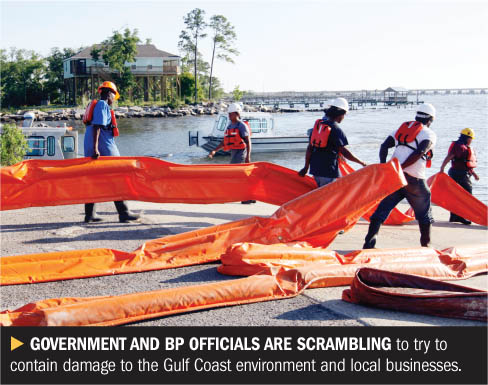Insured losses from the Deepwater Horizon Drilling Platform explosion and subsequent collateral damage to the environment and impacted businesses will likely total about around $1.4 billion, but are not expected to significantly impact this niche marketplace or buying behaviors, industry officials say.
 Companies with exposure to the disaster–in which 11 workers were killed–are insured for losses totaling some $1.4 billion, according to initial reports from the companies involved in the incident, as well as early insurance and reinsurance industry estimates compiled by the Insurance Information Institute.
Companies with exposure to the disaster–in which 11 workers were killed–are insured for losses totaling some $1.4 billion, according to initial reports from the companies involved in the incident, as well as early insurance and reinsurance industry estimates compiled by the Insurance Information Institute.
“The insurance losses from the sinking of the Deepwater Horizon will be significant, and one of the largest losses ever for global offshore energy insurance and reinsurance markets,” said Robert P. Hartwig, an economist and president of the Institute. “The risks inherent in carrying out such a complicated endeavor, however, are well syndicated, with the insured loss spread across a broad spectrum of insurers and reinsurers on a global scale.”
Insured losses could reach $1.5 billion, according to Transatlantic Holdings Inc.
Mike Sapnar, chief underwriting officer, domestic operations for New York-based Transatlantic–an international reinsurance organization–said during the company's first-quarter 2010 results conference call that he expects Transatlantic's losses to be less than 1 percent of industry totals.
Partner Re said total insured losses from the explosion could exceed $1 billion, but noted that ultimate insured losses are unclear “given the multiple parties involved and the ongoing situation regarding control of the oil spill.” The Pembroke, Bermuda-based carrier said its own losses could reach $60-to-$70 million.
Hannover Re indicated its losses could total approximately EUR40 million (about $53.2 million at current exchange rates). “Therewith, we remain considerably below our major loss expectancy for the second quarter,” Hannover Re CEO Ulrich Wallin said in a statement.
Mr. Hartwig pointed out, “It is also important to note that major oil concerns such as British Petroleum make extensive use of self-insurance. This fact, along with the possibility that some parties could eventually exhaust the limits of their insurance coverage as losses mount, means a substantial share if not the majority of losses could be financed by the Deepwater Horizon project participants themselves, through their existing in-house resources.”
Such losses are often self-insured because major events are so rare, he added, noting that the last major oil rig disaster came in 1988, involving Occidental Petroleum's Piper Alpha facility in the North Sea.
Daniel S. Glaser, chair and CEO of Marsh, said the overall market impact of the disaster would be limited.
Responding to a question during a conference call with financial analysts on whether the oil rig incident will affect insurance buying patterns or self-insurance decisions, Mr. Glaser said “what I think you have to bear in mind is that the insurance marketplace is huge. And so any individual loss–outside of a catastrophe loss which involves many, many insureds–any loss to a single insured has a remote possibility of affecting the entire marketplace.”
While he said there may be some upward pressure or concern in the offshore drilling rig market, it will not likely extend to the entire energy marketplace.
“We don't have precise numbers, but in terms of the insurable amount of this loss, most prognosticators are using a number between $1 billion and $2 billion,” Mr. Glaser noted. “So even if you say it is the upper end of that, or even more than that level, it would not be enough, in itself, to impact buying behaviors or the overall insurance marketplace.”
John Nevius, an expert in environmental insurance coverage at the law firm of Anderson Kill & Olick in New York, said it is too early to predict how claims will unfold, but noted it is certain there will be many cases beyond the initial wave of lawsuits already filed.
In addition to traditional liability and business interruption insurance, Mr. Nevius said specialty spill-related or other environmental cleanup coverage is available domestically, generally on a surplus or specialty market basis. Offshore international underwriting syndicates, including the London market, likely will face large claims as well, he said.
He confirmed, however, that many organizations have been known to accept large portions of major oil-spill risks themselves through self-insured retentions or fronting policies going ultimately to client-owned captives.
Regarding the types of litigation that can be expected in the wake of the spill, attorney Keith Hall said wrongful death and personal injury lawsuits from workers on the rig, as well as economic damages from outside parties affected by the spill, will likely arise.
Wrongful death and personal injury suits are already being filed, and settlements should be anticipated, according to Mr. Hall, who handles litigation on oil and gas and toxic torts at the New Orleans law firm of Stone Pigman Walther Wittmann LLC.
There has also been a wave of proposed class-action suits filed on behalf of commercial fishing firms, arguing that the spill is adversely affecting their trade, noted Mr. Hall, who said he expects to see companies in the tourism industry file similar economic damage lawsuits if the spill gets close enough to shore to affect vacation spots.
But Mark Bunim, chair and managing director at Case Closure LLC–an alternative dispute resolution firm specializing in resolving insurance-related disputes–said suits for “tourism is a stretch.” He said the implication for lawsuits against BP and other potential defendants is not necessarily there. “You can go to New Orleans, stay in a hotel, and go to a restaurant and not be affected by this,” he noted.
For hotels along the shore that might have physical damage to their properties from the spill, business interruption claims may arise, and if beaches end up closing, some litigation may occur, but he said urban tourism spots “probably won't be affected.”
Speaking to those entities that do file business interruption claims, Richard Shore, a founding partner of Washington, D.C.-based law firm Gilbert LLP, recommended policyholders do their best to present their claim in a clear-cut, understandable manner to the insurer.
Insurance companies “will be inundated with claims,” he said, adding that carriers will process clear, concise claims faster than ones that are not presented well.
For commercial fishermen, Mr. Bunim said they may look to FEMA for quick dollars to help them survive, as they are essentially out of business and don't have much financing. If federal dollars are used in this case, the government will likely go after BP and other potential defendants to recover that money.
The U.S. government will also go after insurers of BP for the cost of cleanup, Mr. Bunim said. “The odds are it will get settled,” he said. “These cases always get settled.”
As for BP's options, Mr. Hall said the company announcing that it is going to pay for all cleanup costs was “probably smart,” as it shows BP as “trying to be a good corporate citizen.”
He said as investigations proceed to find out what happened, BP may try to demonstrate that fault lies with Transocean, owner of the Deepwater Horizon rig, or Cameron International, which provided gear designed to prevent a blowout.
Mr. Bunim said there will be finger-pointing among the defendants to sort out who will ultimately pay for what. This will likely occur through mediation and settlements, he noted, as the parties will agree on percentages of risk. Allocation of the losses, Mr. Bunim said, will likely be driven by the insurance companies.
Oil Spill Losses Remain Rare
The most expensive oil spill in U.S. history did not involve an oil rig, but an oil tanker, according to the Insurance Information Institute.
The Exxon Valdez incident in 1989 released 37,000 tons (10.8 million gallons) of crude oil into Alaskan waters, noted the Institute, which said cleanup costs alone totaled $2.5 billion–citing figures from the International Tank Owners Pollution Federation.
“While insurers paid hundreds of millions of dollars in connection with the Exxon Valdez disaster, the majority of the losses were paid by Exxon,” said Institute President Robert P. Hartwig. “Likewise, the larger the loss from the Deepwater Horizon incident, the greater the share that will be paid by BP.”
The most expensive oil rig loss in world history occurred with the explosion and fire of Occidental Petroleum's Piper Alpha facility in the North Sea in 1988, which killed 167 workers (compared to the 11 deaths in the Deepwater Horizon incident), the Institute reported.
Insured losses from the 1988 incident totaled $3.4 billion in 2009 dollars, “even though the event was not accompanied by a significant release of oil into the environment,” the Institute added.
Want to continue reading?
Become a Free PropertyCasualty360 Digital Reader
Your access to unlimited PropertyCasualty360 content isn’t changing.
Once you are an ALM digital member, you’ll receive:
- Breaking insurance news and analysis, on-site and via our newsletters and custom alerts
- Weekly Insurance Speak podcast featuring exclusive interviews with industry leaders
- Educational webcasts, white papers, and ebooks from industry thought leaders
- Critical converage of the employee benefits and financial advisory markets on our other ALM sites, BenefitsPRO and ThinkAdvisor
Already have an account? Sign In Now
© 2025 ALM Global, LLC, All Rights Reserved. Request academic re-use from www.copyright.com. All other uses, submit a request to [email protected]. For more information visit Asset & Logo Licensing.








